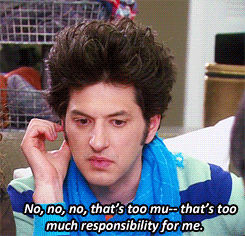Dorian Gray is narcissistic, spoiled, and petulant. He frequently is described as infantile, especially as the years pass and he does not age. From his first appearance in the novel he is described as a “lad”, possessing a “wilful, petulant manner” when he complains about sitting for Basil (16). His youth and beauty are inextricably linked, unfortunately along with his juvenile behavior. A modern fictional character who also embodies these characteristics is Jean Ralphio Saperstein from the tv show Parks and Recreation. Jean Ralphio is the trust fund baby of Pawnee’s local businessman/obstetrician Dr. Saperstein who indulges Jean Ralphio and his twin sister Mona Lisa with requests for cash but acknowledges their multitude of personality flaws. Jean Ralphio is seen to consistently fail at business and resorts to schemes such as being hit by a car (see video at 6:16-6:42) for the insurance money. He is vain about his appearance and flirts with virtually every female character in the show, as well as several male characters, hinting at a bisexual identity.
Even though beauty is seen as more important in both Dorian and Jean Ralphio, their personality flaws are not overlooked by the other characters of their fictional universe. Dorian Gray is first described by Basil Hallward to Lord Henry Wotton as “this young Adonis….a Narcissus…[his] real beauty, ends where an intellectual expression begins” (6). Dorian is compared to the classic Greek ideals of beauty but Basil is quick to acknowledge that Dorian is neither wise nor mature. Basil sees this as a minor fault of Dorians, as his beauty is often to make him Basil’s muse but Henry sees this fault as an opportunity to mold Dorian in his own image, much like a god. Henry admits that he doesn’t mind when his friends are not at his intellectual level like his enemies, he likes his friends for their appearance and “choose[s them] for their good looks” (11). He values beauty above intelligence in his friendships because he gains more from the careful manipulation of someone immature like Dorian over the intellectual conversation of someone wiser like Basil.
Jean Ralphio is not molded after any influence in his life, but greatly resembles Tom Haverford and vice versa. Both young men are obsessed with fashion, women, and power. The difference between them lies in the willingness to put in actual work for their dreams (video at 8:15-9:18). As the series progresses, we see Tom Haverford progress in his governmental and personal business careers, despite several setbacks. Jean Ralphio always has his family money to fall back on, and so his ambition wanes as his professional failures mount. The gif below is from when his twin sister announces she is pregnant, and he realizes the amount of responsibility involved in helping to raise a child. His lack of serious ambition eventually breaks most of the ties he has with his closest friend Tom, much like Dorian’s new found appreciation for the luxuries found in the yellow book and lack of aging drives away many of his former lovers and friends. Both men rely too much on their looks and wealth to avoid serious work and taking responsibility for their actions, which alienates them from their friends and reveals their vain and indolent personalities.

Below are some key sections of this video which are most easily compared to Dorian Gray, but the entire video is worth the watch.
5:55-6:15 Discussing subtle shades of black for a mourning armband.
6:16-6:42 “I got run over by a Lexus” – gaining money through insurance fraud.
8:15-9:18- Conducting his own business is too much work- life of a wealthy socialite.
Note: I own the Vintage Classics edition, and so my page numbers differ from the assigned edition.
I completely agree with this comparison, and I’m glad you found a Dorian within our society because it allows us to understand the character better. I think the comparison works, too, because Dorian is essentially a Lord Byron character, and a Jean Ralphio character: he just plays in life, and everyone praises his antics because it is entertaining. This allows Jean Ralphio and Dorian never to grow up (although, arguably, Dorian does grow up but it destroys him). What would have happened to Jean Ralphio if he had grown up?
I love this comparison to Jean Ralphio. In response to this post and to Charlotte’s comment, I think Tom Haverford is who Jean Ralphio would be if he ever grew up. Tom is very similar to Jean Ralphio at the start of the series, as you mentioned. One of my favorite quotes from the show is said by Tom, “Love fades away. But things…things are forever.” He’s just as much materially driven as Jean Ralphio. And I don’t think that really changes as Tom matures. He works hard and achieves what he set out to do, but he is still unashamedly material. “Treat yo’ self” day is all about that. Tom is still driven by aesthetics, but he doesn’t let that influence his success or personal life the way Dorian and Jean Ralphio do.
Your comparison between Dorian and Jean Ralphio was spot on, and a really interesting (and funny) way of thinking about how youth, beauty, and wealth affect both characters. I thought that your point about how both men’s lack of ambition and obsession with material objects negatively affected their relationships was especially compelling. I’m wondering what you make of the fact that Dorian was arguably obsessed with youth and beauty and material objects for some kind of higher purpose that never really materialized– I haven’t seen all of Parks and Rec so I don’t know for sure, but it seems like Jean Ralphio is also interested in wealth, beauty, and material possessions for some larger goal. Is this goal power, or pursuit of a better life?